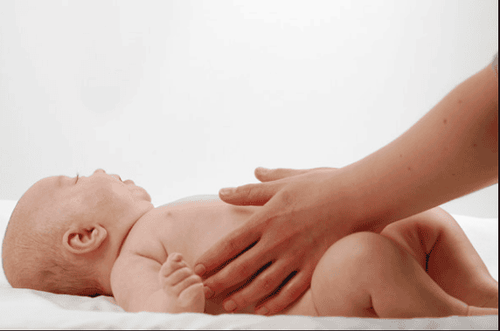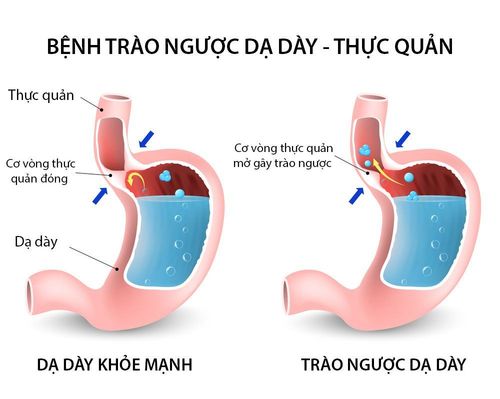This is an automatically translated article.
Posted by Specialist I Trieu Thi Hong Thai - Neonatologist - Neonatology Department - Vinmec Times City International General Hospital
Colic (colic) episodes in infants are often referred to as colic. This is a phenomenon of crying for many hours in babies, from 2-3 weeks to 3 months of age, and can even last longer, often starting suddenly in the afternoon, evening or morning. night. There are many causes of fussiness in babies, so parents need to pay attention to have the best care for their children.
1. What is Colic Status?
Colic is uncontrolled crying in a healthy baby, affecting 8-40% of babies. Most babies cry more during the first 3 months of life than other times, but Colic is different.
Some doctors find it to be a rule of 3: 3 hours of fussing at a time, at least 3 days a week, at least 3 weeks. Usually begins between 3-6 weeks of age. Colic usually comes on suddenly, or at night. The baby cries a lot but can't calm it down, he clenched his fists and pulled his legs up. Every child is different, but Colic usually subsides after 3 months.

Tình trạng Colic diễn ra bắt đầu trong khoảng 3-6 tuần tuổi
2. Causes of Colic?
No one is sure what causes this condition. Some theories suggest that the baby's digestive system is immature or allergic to milk. Others believe that a child's nervous system is still developing, or that a child's personality makes them excitable. Some other theories suggest that, Colic is sometimes caused by an imbalance of bacteria in the digestive system. Research has shown that infants with Colic have altered gastrointestinal microbiota.
3. Clinical manifestations of flatulence
The first stage: The baby's belly tends to be bigger, the child is often twisted, whining when twisting, passing a lot.
When the disease is more severe, the child will feel comfortable when held, the child will twist a lot when lying down, moreover, the baby will cry. The peak of this condition usually falls in the 2-3 months postpartum.
=>>See more advice from Doctor Ma Van Tham - Department of Pediatrics - Neonatology, Vinmec International General Hospital: When should abdominal distention in children be tested?

Khi trẻ rên è è báo hiệu tình trạng đầy hơi
4. What can parents do to help their baby?
There are many causes for a fussy baby, so seek medical advice about your baby's fussiness. The doctor can help control causes such as: looking for digestive problems or urinary tract infections, and the doctor will check to see how the baby is eating and growing normally. Your doctor will also help you figure out how to treat your baby with Colic.
Every child is different and the way to make him more comfortable is also different, so please share with doctors, nurses, experienced people to find a good solution. The following are recommendations for soothing a fussy baby:
Hold the baby, or wrap the baby in a swaddle. Swing gently in your arms or in the crib. Putting your baby on his stomach helps him burp and increase bowel movements. A little noise can help calm the baby. Walking can also calm the baby. Abdominal massage for children, belching after meals also helps reduce symptoms =>>See more advice from Doctor Ma Van Tham - Department of Pediatrics - Neonatology, Vinmec International General Hospital: Diet for children distention

Massage bụng giúp trẻ cải thiện được những triệu chứng của cơn quấy khóc
In addition, parents can warm the child, apply a warm compress, massage the baby's belly, can be through a warm towel, suck on a pacifier. When your baby is fussy, it can make you stressed. It is better to have someone to take care of your baby with you, sometimes you can help calm your baby's fussiness with you. However, you can also leave the baby lying in a safe place, crying for a few minutes, it won't hurt the baby, so you can take a few minutes to relieve stress for yourself.
In some cases where the above measures do not improve, parents can use support from some drugs recommended by doctors such as: Simethicone to help reduce gas in the baby's belly, Probiotics (Lacto Bacillus) Reuteri) helps relieve symptoms.
Most of the time, after 3 months, the baby's digestive system is more mature, the Colic will go away. For premature babies, it may take longer. Therefore, if parents have difficulties in taking care and raising children, parents can ask for help from relatives and medical staff.
In addition, in order to prevent diseases that babies often get, parents should pay attention to nutrition to improve children's resistance. At the same time, add supporting foods containing lysine, essential micro-minerals and vitamins such as zinc, chromium, selenium, B vitamins,... snacks and less digestive problems.
Parents can learn more:
Why do you need to supplement Lysine for your baby?
The role of zinc - Guidelines for reasonable zinc supplementation
Please visit the website Vinmec.com regularly and update useful information to take care of your baby and family.














